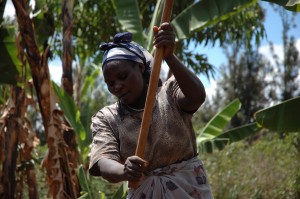
Gender Analysis of Small-Scale Farm Mechanization in Ethiopia and Kenya
 A Royal Tropical Institute (KIT) study funded under the Competitive Grant Initiative of the MAIZE CRP, “Gender Matters in farm Power,” investigates how gender matters in small-scale farm power mechanization in African agriculture, particularly in maize-based systems in Ethiopia and Kenya. KIT collaborated with the International Maize and Wheat Improvement Center’s (CIMMYT) Farm Power and Conservation Agriculture for Sustainable Intensification (FACASI) project on the study in order to leverage FACASI’s experience with national project partners and to build on and complement the project’s work.
A Royal Tropical Institute (KIT) study funded under the Competitive Grant Initiative of the MAIZE CRP, “Gender Matters in farm Power,” investigates how gender matters in small-scale farm power mechanization in African agriculture, particularly in maize-based systems in Ethiopia and Kenya. KIT collaborated with the International Maize and Wheat Improvement Center’s (CIMMYT) Farm Power and Conservation Agriculture for Sustainable Intensification (FACASI) project on the study in order to leverage FACASI’s experience with national project partners and to build on and complement the project’s work.
The study examines how intra-household gender dynamics affect women’s articulation of demand for and adoption of mechanization in Ethiopia and Kenya. Overall the study found that women tend to experience high labor burden and intensity, yet rarely articulate demands for mechanization. It was concluded that this is due to “the complex interplay of values and assumptions, access to and control over resources and intra-household decision-making,” key aspects of gender roles that ultimately constrain or enable women’s demand articulation and technology adoption. The aim of the study is to ensure that gender dimensions are addressed as an integral part of future mechanization interventions and agricultural research.
To read the full story, please click here:
To read the study, please click here:
Africa, Competitive Grant Initiative, Ethiopia, FACASI, gender, Kenya, KIT, Maize
